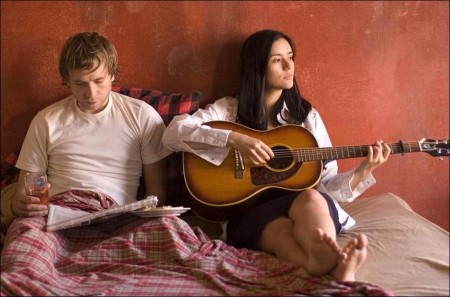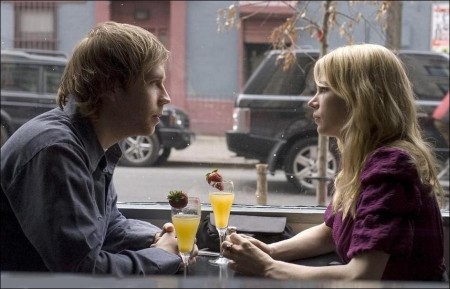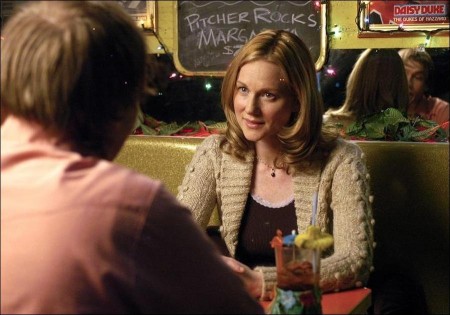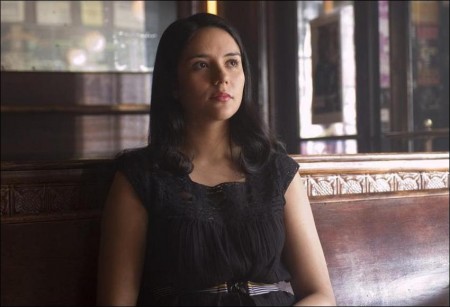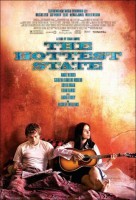Tagline: “My heart is gold. What will you give me for it?” – Tennessee Williams
Adapted by Ethan Hawke from his novel of the same name, The Hottest State explores the joy, pain, erotic highs, and emotional lows of first love. William (Mark Webber) is a modern-day Romeo, a young actor so in love with the idea of love that he recklessly leaps into a romance. The object of his affection is Sara (Catalina Sandino Moreno), an aspiring singer who is more cautious and down-to-earth in her approach to relationships.
With great wit, charm, and insight, Hawke, who also serves as director of the film, chronicles his appealing young hero’s quest to find a woman who loves him as much as he loves her, a pursuit destined to lead straight to heartbreak.
Joining Webber and Sandino Moreno in an impressive ensemble cast are Laura Linney and Ethan Hawke, who play William’s parents, Michelle Williams, and Sonia Braga.
The Hottest State also features music by awarding-winning composer Jesse Harris, who has created a score that expresses all the magic – and the mysteries – of the human heart. Hawke’s novel, which was published in 1997, set out to explore new territory.
“I felt like there had been a tremendous amount of fiction about women getting their hearts broken and the loss and weakness they felt when their love was abandoned, but I never read a novel about a man going through it so, I tried my hand at writing one,” recalls Hawke. Critics called the book “touching,” engaging,” and “beguiling,” and said it was “full of the freshness of love and the agony of loss.” While The Hottest State is not a memoir, it falls into the category of autobiographical fiction and is definitely drawn from Hawke’s life experiences.
Hawke decided to adapt his novel while he was directing his film, Chelsea Walls. When he cast Mark Webber in that project, Hawke realized that the young actor matched his image of the character “William” in The Hottest State. “Mark Webber was the catalyst for me to start working on the film adaptation,” Hawke explains. He instantly saw qualities in Webber – innocence, sensitivity, and earnestness – that would bring the character to life. Webber, who admits to having had his share of broken hearts, identified with the character. “The thing I like the most about the film is that it speaks to any age range,” he says. “You can remember what it was like to feel that way, or you could be feeling it right now.”
Casting the role of “Sara,” was a more difficult process. “Sara was never defined as clearly because she was an ambiguous figure in William’s psyche,” says Hawke. “She is not just a frivolous beauty, but a woman worth impaling yourself over. Catalina Sandino Moreno fit the bill. She intrinsically carried the mystery, passion, and soul of a true heartbreaker.” Nominated for an Academy Award for her astonishing performance in “Maria Full of Grace,” Sandino Moreno artfully creates a “Sara” who is at once both real and idealized. When Hawke first approached her with the idea, she had difficulty imagining herself in a romance. But, as soon as she read the script, Sandino Moreno wanted to play the role. “I read it in half an hour and I was crying,” she remembers. “It was something that had happened to me. It was so pure and personal that I had to do it.”
For “Samantha,” the beautiful and complicated young woman who was William’s previous romantic obsession, Hawke selected Michelle Williams, who was nominated for an Academy Award for her performance in “Brokeback Mountain.” Laura Linney, an Academy Award nominee for “Kinsey” and “You Can Count on Me,” plays “Jesse,” William’s eccentric mother, and Hawke, nominated for two Academy Awards – Best Supporting Actor for “Training Day” and Best Adapted Screenplay for “Before Sunset” – plays “Vince,” William’s errant father. This stellar cast is rounded out by Sonia Braga, who plays Sara’s mother.
Hawke’s perceptive story of the agonies of young love is timeless in its themes. He was happy to find that he did not have to make substantial changes when he set out to adapt his novel. “The changes were mostly superficial. Updating the time period, for example (the book took place in the 90’s) was one change we made. What is substantive to the story doesn’t alter whether the characters are text messaging each other or delivering hand written notes,” he points out.
As for the challenges of directing, “Obviously working with a modest budget to tell a story that is dear to your heart presents many challenges, but I would be lying if I didn’t admit that working with my collaborators provided some of the most joyous experiences of my life, professional or otherwise,” Hawke says. “And the cinema gods would strike me dead if I lodged even one complaint.”
One of Hawke’s most significant collaborations was with composer Jesse Harris. Since Sandino Moreno’s character is a musician and a songwriter, Hawke knew her music would set the tone for the film. He approached Harris, whom he had known since the early 90’s. “There was always something slightly irritating about how much girls were enamored by his casual, big smiling “hey let’s all just hang” kinda demeanor,” Hawke recalls. The truth was that as I watched him and his music grow up, it became obvious that I was just jealous – there was and is something deeply talented about the guy – wise, simple, clean, elegant and disarmingly unaffected. More than anything else, he is a true romantic.”
Harris read the script and was incredibly insightful about the story and its themes. He gave Hawke about 50 songs that would be good choices for Sara and wrote two new ones, including “Never See You.”
“I was overwhelmed by the quality and by how perfectly matched his writing was to my aspirations for the tone and mood of the film,” says Hawke. “An idea began to develop: What if we scored the film entirely with original songs written by Jesse, and performed by contemporary artists, hand-picked to match certain scenes? We could approach the ideal artist to perform the song and score the entire film this way. All the music in the film would be original. For example, the movie is scripted to open with a flashback to late 70’s in Texas: Willie Nelson doing Jesse’s “Always Seem to Get Things Wrong” would be perfect. Later in the film our hero is walking through Brooklyn so depressed he feels his eyes might bleed: Cat Power doing “Its Alright to Fail” would nail it. Who should be playing in the background of a Williamsburg party? Bright Eyes. Falling so madly in love you forget your own name? Norah Jones, “World of Trouble.”
Harris quickly became an integral part of the making of The Hottest State, working closely with Hawke to realize their dream of an original and innovative score. “I sat with him for hours at a time as we imagined the music cues and found songs to correspond to what I imagined the filmmaking would be doing. His voice as a writer became kind of a third character, a Greek Chorus, echoing and supporting the characters and the themes.”
Harris’ music is expressive of young love and young pain. “As it turns out, I have a lot of songs on the subject!” says Harris. “The process of creating musical equivalents for the characters’ emotions was a matter of choosing the right song for the right singer. Ethan listened to about 70 songs to pick the ones he wanted. The two new ones, ‘Never See You’ and ‘It Will Stay with Us,’ are more reflexive. For the instrumental score, I assembled musicians in the studio and performed the music while watching the scenes. Ethan would direct us, explaining how he wanted the music to change as the scene progressed.” The result is a unique musical experience: Harris’ distinctive music integrates perfectly with Hawke’s images.
Hawke fulfills his ambition of creating a vivid and emotionally-charged portrait of a young man caught up in the bittersweet throes of love. “Young love is fickle,” says Hawke. “I don’t think relationships have changed a great deal. Having spent my life doing plays by Shakespeare, Chekhov, Tennessee Williams, and the like, you notice, in regards to romance, things haven’t changed very much at all.”
About the Music
01 Rocha – “Ya No Te Veria Mas (Never See You)”
02 Willie Nelson – “Always Seem to Get Things Wrong”
03 Feist – “Somewhere Down the Road”
04 Bright Eyes – “Big Old House”
05 Emmylou Harris – “The Speed of Sound”
06 Jesse Harris – “It Will Stay With Us”
07 The Black Keys – “If You Ever Slip”
08 M. Ward – “Crooked Lines”
09 Norah Jones – “World of Trouble”
10 Brad Mehldau – “Never See You”
11 Cat Power – “It’s Alright to Fail”
12 Jesse Harris – “One Day the Dam Will Break”
13 Tony Scherr – “You, the Queen”
14 ‘Score’ – “Morning in a Strange City (Cafe)”
15 Rocha – “No More”
16 Jesse Harris – “Dear Dorothy”
17 Rocha – “Never See You”
18 ‘Score’ – “There Are No Second Chances”
Harris on the Music of the Hottest State
1. “Ya No Te Veria Mas” (Never See You), Rocha
Rocha sings the song accompanied only by Harris on acoustic guitar. “It was Ethan’s idea to have Rocha translate the song into Spanish,” says Jesse. “When the film starts, Sara’s singing her new song in Spanish with William (the main character) in the room, but she’s singing, ‘I’m never gonna see you again,’ and giving off a sense of foreboding that most of the audience won’t even be aware of at that point.”
2. “Always Seem to Get Things Wrong,” Willie Nelson
Norah Jones is on piano and Tony Scherr plays rhythm guitar behind Nelson’s lead part on this track, produced by Harris and recorded in New York. “That song was a no-brainer for Willie Nelson. He showed up with his guitar and long-time harmonica accompanist Mickey Raphael, and we did three live takes with everybody in the room together – no overdubs – and the one that’s on the record is the third take.”
3. “Somewhere Down the Road,” Feist
Recorded in Paris by the artist and her band. “When I opened for Feist in Europe, I sang ‘Somewhere Down the Road’ every night. She loved it and asked me to teach it to her – she wanted to cover it. So when this project started, there was never any question what song she was going to record.”
4. “Big Old House,” Bright Eyes
Conor Oberst recorded the track in New York with his band and longtime studio collaborator Mike Mogis, who engineered and mixed as well as playing pedal steel. “I’ve been friends with Conor for a number of years; he was a big fan of ‘Big Old House’ and the album it came from, Without You. When we started this project, I picked another song for him, and he said, ‘Well, I’d really like to do ‘Big Old House,”’ which I thought was great. They tracked it in New York, but when I asked if I could come to the session, they said no,” Harris recalls with a laugh. “They wanted to surprise me.”
5. “The Speed of Sound,” Emmylou Harris
The renowned song interpreter cut the track in Nashville with her original producer, and former husband, Brian Ahern, who also played what he called “earthwood” bass. “Ethan picked the song for Emmylou, and it was a good call.”
6. “It Will Stay With Us,” Jesse Harris
This newly written song is the first of three tracks recorded specifically for the soundtrack by its author. “Later in the process, Ethan decided he wanted me to do a solo acoustic song for the end credits, so I came up with this tune.”
7. “If You Ever Slip,” The Black Keys
“We picked a bluesy tune for them, which they took and just turned upside down. We were really shocked when we first heard it, but then it grew on us so much. It’s used in this scene where the character’s really amped up and angst-ridden over the girl, marching down the street in Williamsburg, and it’s a perfect fit.”
8. “Crooked Lines,” M. Ward
On this Ward-produced track, which evokes Randy Newman’s Good Old Boys album, Jones plays piano and sings background vocals, with her musical and life partner Lee Alexander on upright bass and lap steel. “Ethan had never heard M. Ward before, and as soon as he heard him sing, he said, ‘He should do ‘Crooked Lines,’ and I completely agreed with him.”
9. “World of Trouble,” Norah Jones
This song was one of the Harris-written tunes Jones picked for her debut album, Come Away With Me, including the Grammy-winning “Don’t Know Why,” but she decided not to record it after realizing, according to Harris, that “she was too young to sing it. But this time she felt like she was old enough to put it across, so she decided to do it for the soundtrack.”
10. “Never See You,” Brad Mehldau
Mehldau plays solo piano on this instrumental version of the movie’s key song. “Ethan thought it would be really cool to do a jazz version of one of the tunes. Brad cut it in New York, but he wouldn’t let me come to the studio either, at least until after he had already recorded it and was listening back to the various takes of the song in 3 different keys. He told me, ‘Please don’t come until after – it’ll make me self-conscious.’”
11. “It’s Alright to Fail,” Cat Power
Harris produced the track, as well as accompanying the artist on guitar and banjo. “Again, that pairing was Ethan’s idea. It was quite an ordeal just getting in touch with her; she’s a woman without an email address, she doesn’t answer the phone, she doesn’t have a manager and she only text-messages. I only talked to her once before going to Miami to record the track. We did it live in the studio, sitting across from each other, and then I added some banjo and she sang some backing vocals – that was it. She was really fast in the studio, and really great.”
12. “One Day the Dam Will Break,” Jesse Harris
A more elaborate version of a song Harris recorded for his album While The Music Lasts featuring the instrumentation Hawke had chosen for the band in the film – upright bass and piano, drums and acoustic. “Ethan picked that one for a scene in the movie that he felt needed a medium-tempo rock song.”
13. “You, the Queen,” Tony Scherr
A solo performance with vocal and acoustic guitar from Harris’ cohort. “Tony was there at Stratosphere Sound on the day we recorded the Norah and Willie tracks because he played on both of them. He was out in the studio, singing to warm up; Ethan heard him and asked if he knew any of my tunes. He said yes and started singing ‘You, the Queen.’ We recorded it right then – and it just works beautifully in the film.”
14. “Morning in a Strange City” (score)
This score piece is given its earthy Latin texture by accordion, marimba and trumpet. “That melody is a theme that runs through the entire sequence of the film that takes place in Mexico. We did five different versions of the melody, and this is the mellow version where they’re having dinner in a restaurant, drinking tequila, and then the trumpet comes in when they go to the bathroom together.”
15. “No More,” Rocha
“In the last scene, William goes back to see Sara perform, and she sings this song. Ethan thought it would be perfect for that scene because it has such a looking-back lyric.”
16. “Dear Dorothy,” Jesse Harris
“That song was an outtake from my While the Music Lasts album. We re-recorded it because Ethan wanted an upbeat shuffle for a particular scene.”
17. “Never See You,” Rocha
The English-language version of the film’s central song. “The lyric is somewhat abstract, but the movie has so much longing and loss in it, and the song is saying, ‘We’re having this close moment, but that’s it – it’s fleeting.’ Ethan thought the song really matched the tone of the film.”
18. “There Are No Second Chances” (score)
This cue features Harris and Scherr’s guitars – along with the clearly audible sound of Scherr breathing, a la James Gandolfini in The Sopranos. “Tony had terrible asthma that day – he sounded like a dying dog! – but it adds a real texture to the track. It’s only two guitars, but it’s probably the noisiest recording I’ve ever made.”
Production notes provided by THINKFilm.
The Hottest State
Starring: Catalina Sandino Moreno, Laura Linney, Mark Webber, Michelle Williams, Sonia Braga, Ethan Hawke
Directed by: Ethan Hawke
Screenplay by: Ethan Hawke
Release Date: August 24, 2007
MPAA Rating: R for sexual content and language.
Studio: THINKFilm
Box Office Totals
Domestic: $31,216 (22.7%)
Foreign: $106,125 (77.3%)
Total: $137,341 (Worldwide)
